A complete 2025 playbook for respectful outreach in Poland. Covers law, culture, cooperation, and training.
Check out the brand NEW WELCOME CENTRE
Youth leadership mission trips Poland create lasting change because they place teenagers in proven discipleship environments where leadership is tested in real time. In 2025, Poland offers one of the strongest ecosystems in Europe for this: summer English camps, bilingual outreach, refugee-integration programs, and year‑round leadership tracks run by ministries like Josiah Venture, Proem, Word of Life, and YWAM. These aren’t ad‑hoc projects; they are structured pipelines where visiting teens step into meaningful roles—leading small groups, co‑teaching English, running sports blocks, and debriefing with mentors—while Polish hosts continue discipleship after the trip. This ensures momentum for both the visitors and the local church long after campfires go cold.
Poland’s context is strategic. Entry is visa‑free for most US/UK/CA teams under 90 days, so logistics don’t overshadow formation. Gen‑Z Poles are navigating rapid secularization, and many Ukrainian youth remain in Poland since 2022, creating bilingual and cross‑cultural ministry settings that stretch visiting teams. When structured with intentional pre-trip training and post-trip integration, these journeys multiply outcomes. See how English Wizards partners with local Polish ministries to make this possible. These journeys multiply outcomes: teens return home with sharpened leadership, while Poland’s ministries expand their reach. This guide unpacks why Poland is an ideal training ground, how to prepare and measure growth, and how to ensure impact continues.

Poland offers more than a destination; it provides a living classroom for youth leadership mission trips Poland. Unlike ad‑hoc projects, national ministries have built youth‑discipleship systems that give teens meaningful responsibility and continuity. Networks like Josiah Venture, Proem, Word of Life, and YWAM run established pipelines where visiting students don’t spectate—they co‑lead. Facilitating small groups, coaching English conversations, running sports blocks, sharing testimonies, planning activities, and debriefing each day with mentors all push teenagers into active leadership while Polish hosts secure long‑term follow‑up.
Cultural fit. Catholic identity remains strong, yet many Gen‑Z and urban youth have drifted from institutional practice. That combination favors honest testimony, peer‑led dialogue, and Scripture engagement in small groups. Camps and youth nights function as neutral bridges where Polish teens explore identity and faith with international peers. For visiting teams, this environment demands humility, listening, and facilitation—leadership by presence rather than performance.
Practical access. Teams from the US, UK, and Canada can normally enter visa‑free for up to 90 days, and Poland’s rail and coach networks make camp venues easy to reach. Bilingual hosts lower language friction, so leaders can spend time on formation instead of bureaucracy. Since 2022, many Ukrainian teens have been integrated into programs, adding bilingual teamwork, trauma‑aware service, and compassion that further stretch student leaders. Few European contexts combine safety, openness, and structured ministry ecosystems at this scale.
New to the wider picture? See our overview of short‑term Christian outreach in Poland before drilling into youth‑specific leadership pathways.
Among teens, Catholic identity often functions as heritage more than practice. That’s not an obstacle to ministry; it’s an opportunity for relational conversation. When peers share authentic stories and invite discussion, Polish students engage because the format is personal, not confrontational. This is ideal terrain for visiting youth to practice leadership through listening, guiding dialogue, and inviting next steps.
Schengen access, modern transport, and bilingual hosts remove practical barriers. Add Poland’s deep history, hospitality, and interaction with Ukrainian peers, and every day presents layered leadership challenges: cross‑cultural service, compassion under stress, and gospel conversations in bilingual settings. Students grow because the context requires it—leadership by necessity, not theory.
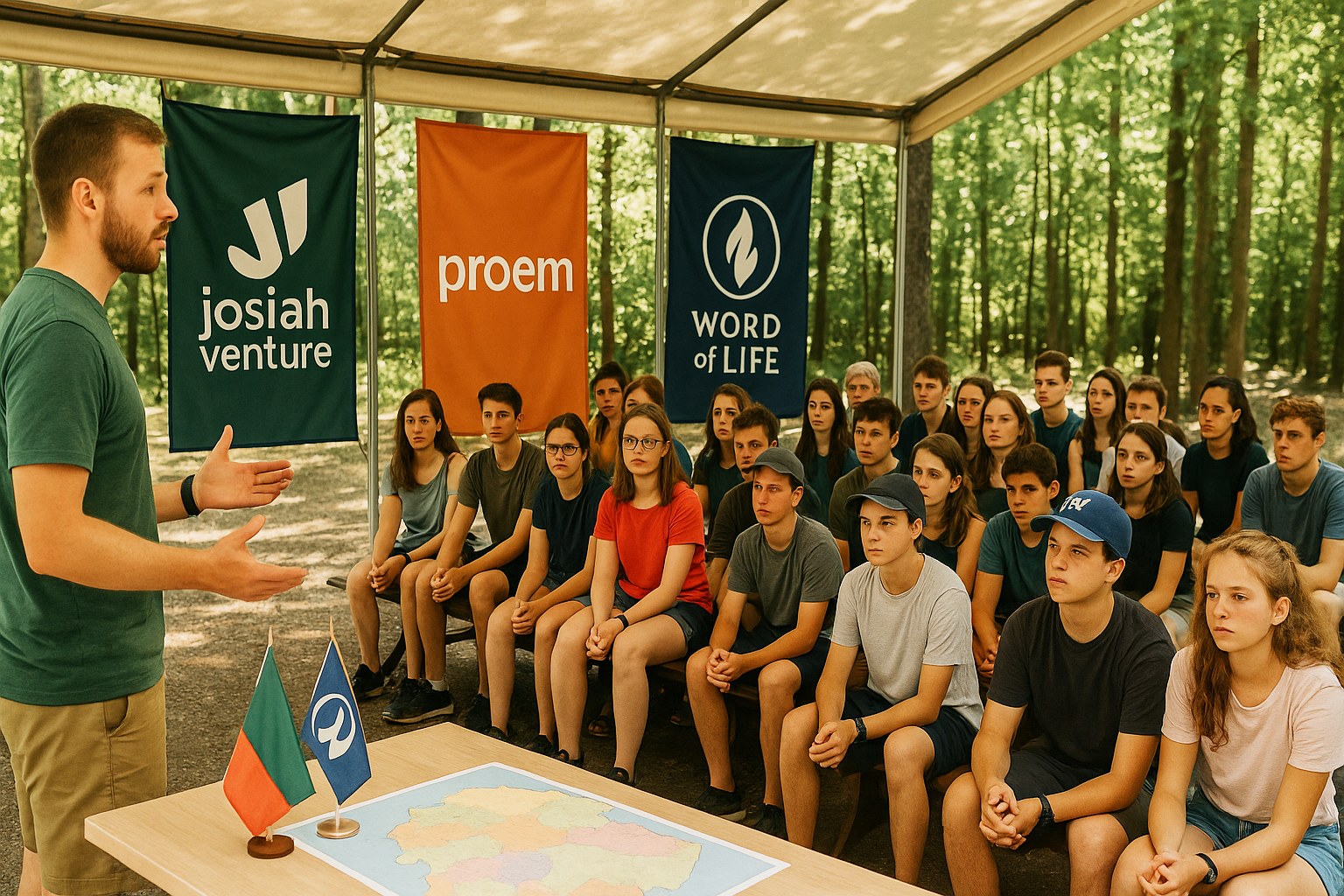
When planning youth leadership mission trips Poland, one of the greatest advantages is the country’s highly developed ministry infrastructure. Unlike destinations where short-term teams struggle to find continuity, Poland has long-standing organizations that specialize in discipleship pipelines. Four in particular stand out: Josiah Venture, Proem Ministries, Word of Life, and Youth With A Mission (YWAM). Each has a distinct focus but shares the same goal — equipping teens to lead, serve, and multiply impact.
Active since the 1990s, JV operates the H2O Training Center in southern Poland. This campus hosts evangelistic English camps, sports and music camps, and year-round leadership programs. JV’s model pairs foreign youth with Polish peers in bilingual camps while training Polish interns as leaders. This ensures that outreach does not end when international teams leave; local leaders continue discipling students back in their churches.
Based at a campus in Zakościele, Proem runs summer camps that attract thousands of kids and teens each year. Foreign youth groups partner to lead workshops, games, and testimonies. Proem also responds quickly to community needs — in 2022 they opened a Help Center for refugees. Their programs give teens both ministry practice and a tangible experience of servant leadership.
WOL partners with about a dozen local churches, offering Bible camps, leadership conferences, and its innovative “English4Life” residential program. Here, post-high school youth improve English while studying Scripture daily. Visiting teams often serve as English teachers and counselors, modeling servant leadership while strengthening Polish churches with fresh energy.
Youth With A Mission maintains several bases, including the “Wave of Revival” hub in Rzeszów that emerged during the refugee influx. YWAM engages youth through Discipleship Training Schools and programs like King’s Kids, where teens learn practical outreach. Visiting groups often join bilingual youth clubs, refugee programs, or evangelistic events — experiencing hands-on leadership in cross-cultural settings.
Collectively, these ministries form an unmatched environment for youth leadership trips. They provide structured programs, bilingual integration, and continuity with Polish believers. This ensures visiting teens are not isolated helpers but part of a living pipeline of discipleship and leadership development. For those planning teams, tapping into these infrastructures eliminates the risk of “hit-and-run” missions. Instead, every effort is tied to long-term impact.
For ethical and sustainability considerations when joining these ministries, see our guide on ethical and sustainable mission practices, which explains how to avoid common voluntourism pitfalls.
Through our Kraków partnership, English Wizards now offers direct placements into these ministry networks. Learn more about joining these youth leadership programs with EW.
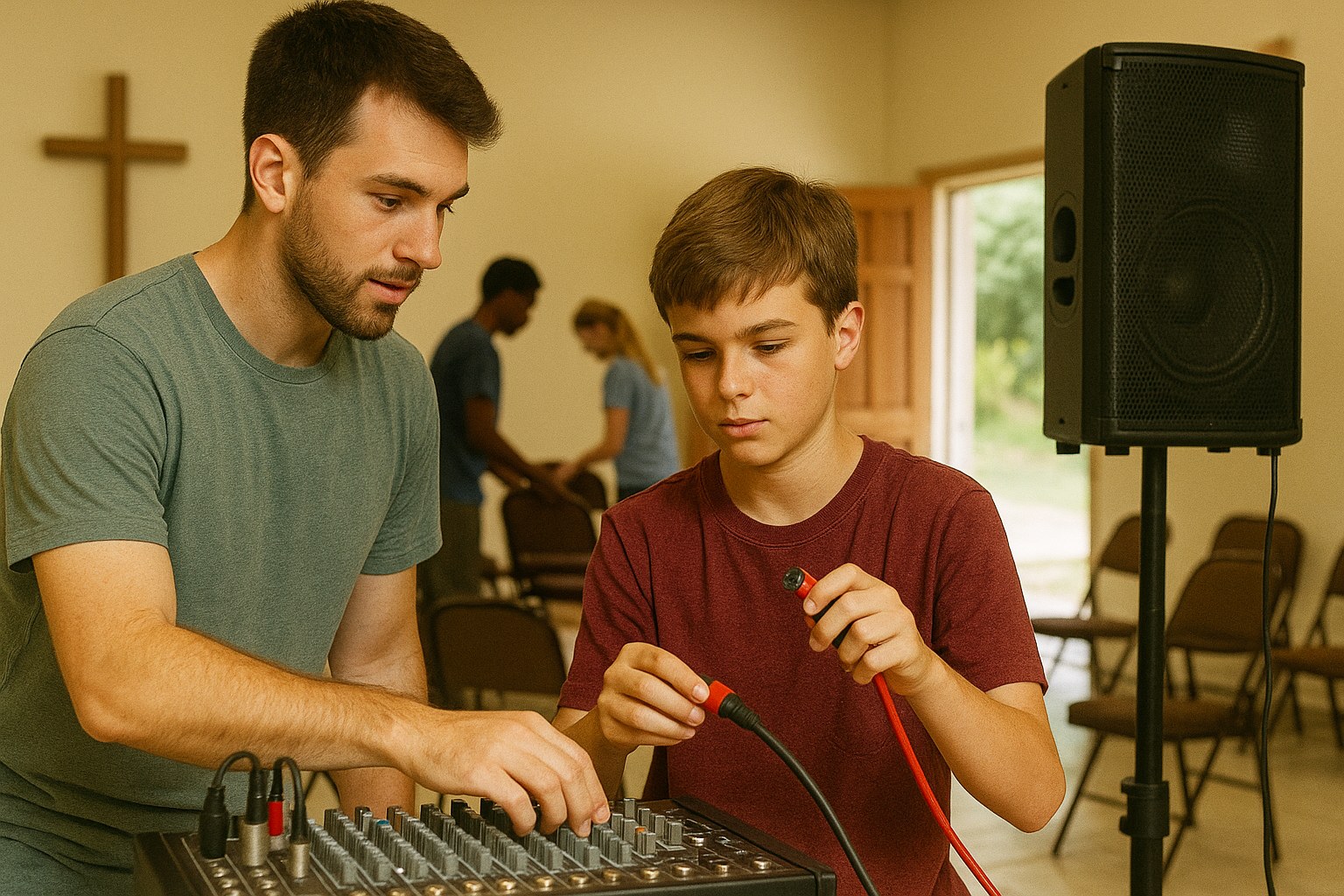
The most effective youth leadership mission trips Poland are not just about serving but about training. Poland’s youth ministries intentionally weave leadership formation into every camp, club, and outreach. Visiting teams play a dual role: they contribute to local ministry while being coached themselves in methods that sharpen leadership for life. Structured pre-trip preparation, on-trip mentoring, and post-trip debriefs are what transform a short-term trip into long-term growth.
Preparation begins months before departure. Teams are introduced to Polish culture, Catholic heritage, and the dynamics of post-Catholic youth. Role-play, Bible study on servant leadership, and scenario-based training build readiness. Some organizations require students to complete a pre-trip discipleship journal — practicing daily devotions, prayer, and reflection. This ensures teens arrive already primed to serve, not as consumers but as co-laborers.
During camps, mentorship is immediate and hands-on. A student may be asked to lead a small group in English, run icebreakers, or share a personal testimony. Afterward, a Polish leader or missionary coach debriefs them: What went well? What could improve? This reflection cycle creates rapid leadership growth. Teams also participate in staff meetings where teens practice planning, communication, and conflict resolution under supervision. Mistakes become laboratories for learning.
Josiah Venture pioneered “discipleship labs” at their H2O Center, mixing workshops, peer-led Bible studies, and evangelism in public settings. Teens learn how to explain faith clearly in conversations with Polish peers who may be skeptical of institutions. Leadership here means navigating real questions in a respectful, relational way. These labs are cross-cultural by design, forcing students to adapt, listen, and guide gently. The outcome: leadership defined by humility and clarity.
Language is central to training. English is used as a bridge, but teens are also challenged to learn and use Polish basics: greetings, testimonies, prayers. Struggling through Polish phrases teaches humility, while Polish peers feel honored. This exchange shifts leadership from “expertise” to “servant posture,” a critical reframing for youth leaders. Bilingual dynamics also model what cross-cultural ministry will demand in future contexts.
For practical guidance on navigating Poland’s Catholic majority respectfully during these training encounters, see our article on respectful youth evangelism methods, which outlines how to share faith with cultural sensitivity.

Youth leadership mission trips Poland place students in one of the most unique cross-cultural contexts in Europe. Unlike destinations where teams serve in monolingual or homogeneous communities, Poland’s youth landscape is now bilingual and multi-cultural. English has become a highly sought-after skill, Polish youth are open to practicing it with foreigners, and since 2022 millions of Ukrainian teens have been integrated into Polish schools and churches. These realities turn every camp, youth club, or outreach into a cross-cultural training ground.
English is the magnet. Camps and youth nights across Poland are often advertised as “English Camps,” drawing Polish students who want to practice conversation. For American or British teams, this opens doors naturally: teens are eager to engage, and conversations quickly move from small talk to personal stories. Team members practice servant leadership by listening, encouraging, and guiding discussions rather than lecturing. Language learning becomes discipleship in disguise.
At the same time, students are challenged to learn basic Polish. Saying “Dzień dobry” (hello) or “Bóg cię kocha” (God loves you) communicates humility and respect. Even stumbling through Polish phrases models vulnerability and cultural adaptation. It shows Polish peers that visiting leaders are learners too. This mutual exchange breaks down barriers and reframes leadership as shared growth rather than foreign expertise.
The refugee crisis transformed youth ministry in Poland. Millions of Ukrainian families, many with teens, now live in Polish towns and cities. Camps often include Polish and Ukrainian students together. For visiting teams, this multiplies cross-cultural layers: navigating bilingual settings (Polish and Ukrainian, often with English as the common thread), practicing trauma-aware compassion, and creating inclusive environments where every teen feels seen. Leaders emerge not by dominance but by empathy and adaptability.
When teens return home after navigating these bilingual environments, their leadership is measurably stronger. They have learned to listen more than they speak, to adapt when misunderstood, and to show respect across cultures. These skills are transferable: leading peers at school, serving diverse communities, or joining global missions later in life. Poland’s bilingual and refugee-integrated context is therefore not a challenge to overcome but the very crucible in which leadership maturity forms.
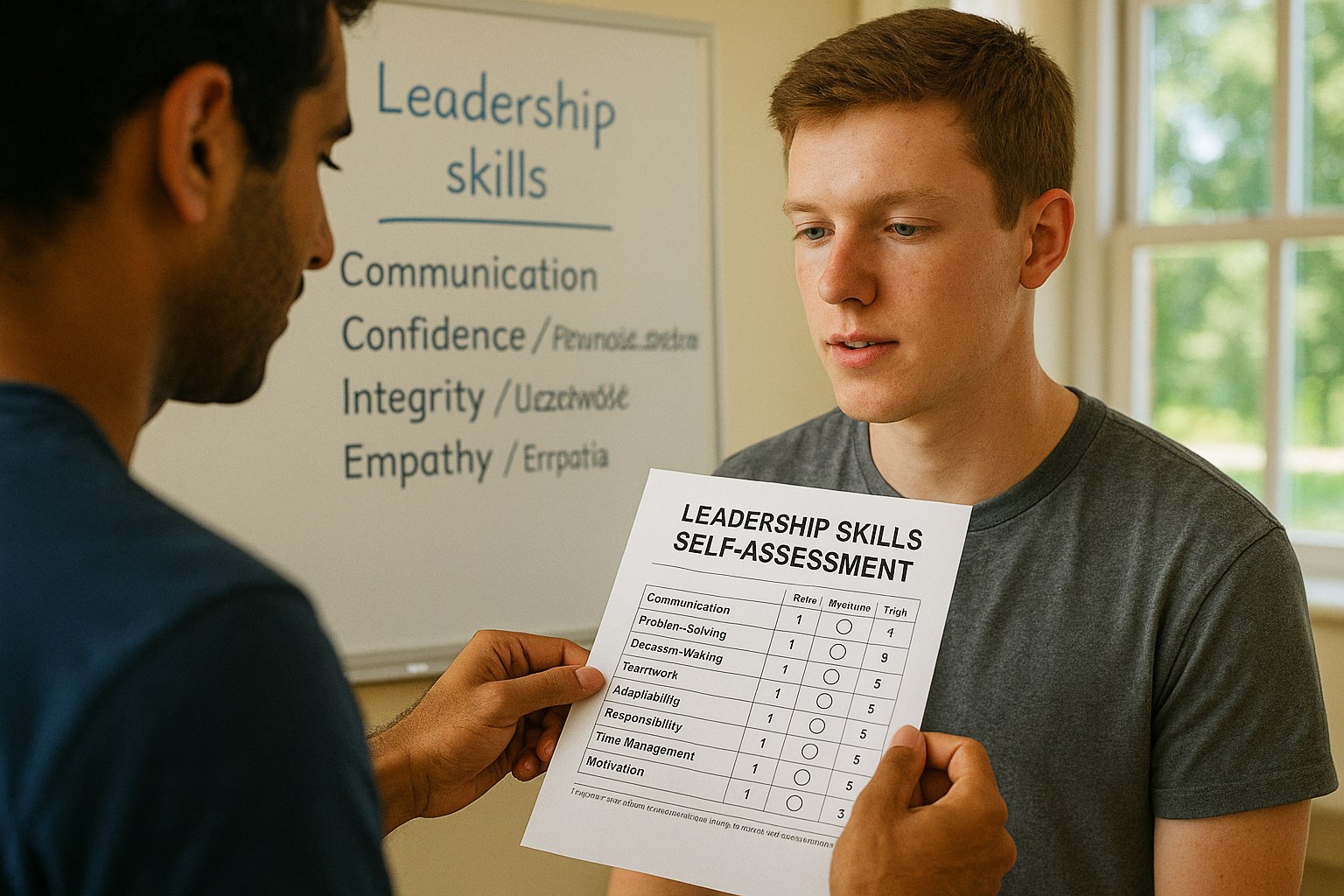
One of the greatest strengths of youth leadership mission trips Poland is that they don’t just create memories — they create measurable growth. Ministries across Poland have developed practical frameworks for tracking leadership outcomes so teams can see transformation during and after the trip. Without measurement, impact is guesswork. With clear tools, students return home able to name how they grew and how they’ll keep serving.
Many host organizations require students to complete a self-assessment before and after the trip. These surveys track confidence in skills like public speaking, group facilitation, cross-cultural communication, and personal devotions. After the trip, teens revisit the same questions and compare progress. Growth is made visible, and leaders can celebrate specific gains such as “I now feel confident leading a Bible discussion” or “I learned how to manage a small group”.
On the ground, Polish mentors and missionaries often use simple rubrics to evaluate visiting teens. They assess initiative, teamwork, and adaptability. After a small group session, for instance, a coach might score a student on listening skills, clarity, and engagement. These evaluations are not about performance grades but about feedback loops. Teens get real-time notes on what they did well and where to grow, which accelerates development.
Post-trip integration is critical. Some ministries provide each participant with a 90-day leadership plan: a simple document asking, “How will you use what you learned in your school, church, or community?” Teens commit to leading one activity (like a small group or youth night) and set goals with accountability from their home church leaders. This ensures the trip’s impact flows back into local contexts rather than ending at the airport.
Our program includes these assessment tools, built into every trip. Discover how EW measures leadership growth.
Not all growth is quantifiable. Testimonies — a teen saying “I prayed out loud for the first time” or “I learned to share my faith in another language” — are powerful qualitative measures. Collecting these stories provides both encouragement and evidence. When shared with supporting churches, they demonstrate that the trip was not a vacation but a leadership laboratory.
For more on how to integrate ethical frameworks into leadership outcomes, see our guide to ethical youth leadership mission training, which explains why accountability and feedback matter for sustainable growth.

Too many youth leadership mission trips Poland stop at the airport. Students return home inspired but without a plan, and within weeks the lessons fade. The most effective ministries in Poland design structured post-trip integration that continues discipleship and leadership growth long after the summer is over. This turns a two-week mission into a lifelong leadership trajectory.
Immediately after the trip, teams hold guided debrief sessions. Students are asked to name highlights, challenges, and growth points. They reflect on cultural differences they observed, friendships they built, and moments they led. This reflection cements learning and helps students articulate what God has done. It also prepares them to share testimonies with their home churches and peers, multiplying the impact of their stories.
Partnering churches back home play a key role. Teens are encouraged to step into visible leadership upon return — leading a youth night, running a small group, or organizing a service project. Many ministries provide a “leadership toolkit” for pastors, equipping them to channel post-trip enthusiasm into ongoing service. This ensures the mission benefits not just Poland, but also strengthens the sending church.
Long-term fruit grows when relationships are maintained. Teams often set up pen-pal or online mentoring with Polish peers they served alongside. Some churches establish recurring partnerships with the same ministry, so students can return as leaders-in-training the following year. These connections reinforce that the trip was not a one-off event but part of an ongoing international partnership.
Post-trip planning also protects against unhealthy patterns. Without structure, students may treat missions as a spiritual “high.” Ethical guardrails ensure trips build discipleship rather than consumerism. This means encouraging long-term accountability, preparing for reverse culture shock, and emphasizing that serving at home is as vital as serving abroad. Integration plans stress that the mission trip is a launchpad, not a finish line.
For frameworks that ensure trips remain healthy and impactful, see our guide to ethical framework for youth mission trips, which explains how to safeguard against burnout and voluntourism. English Wizards helps your students bring lessons home with ready-made integration guides. See how EW supports post-trip leadership plans.
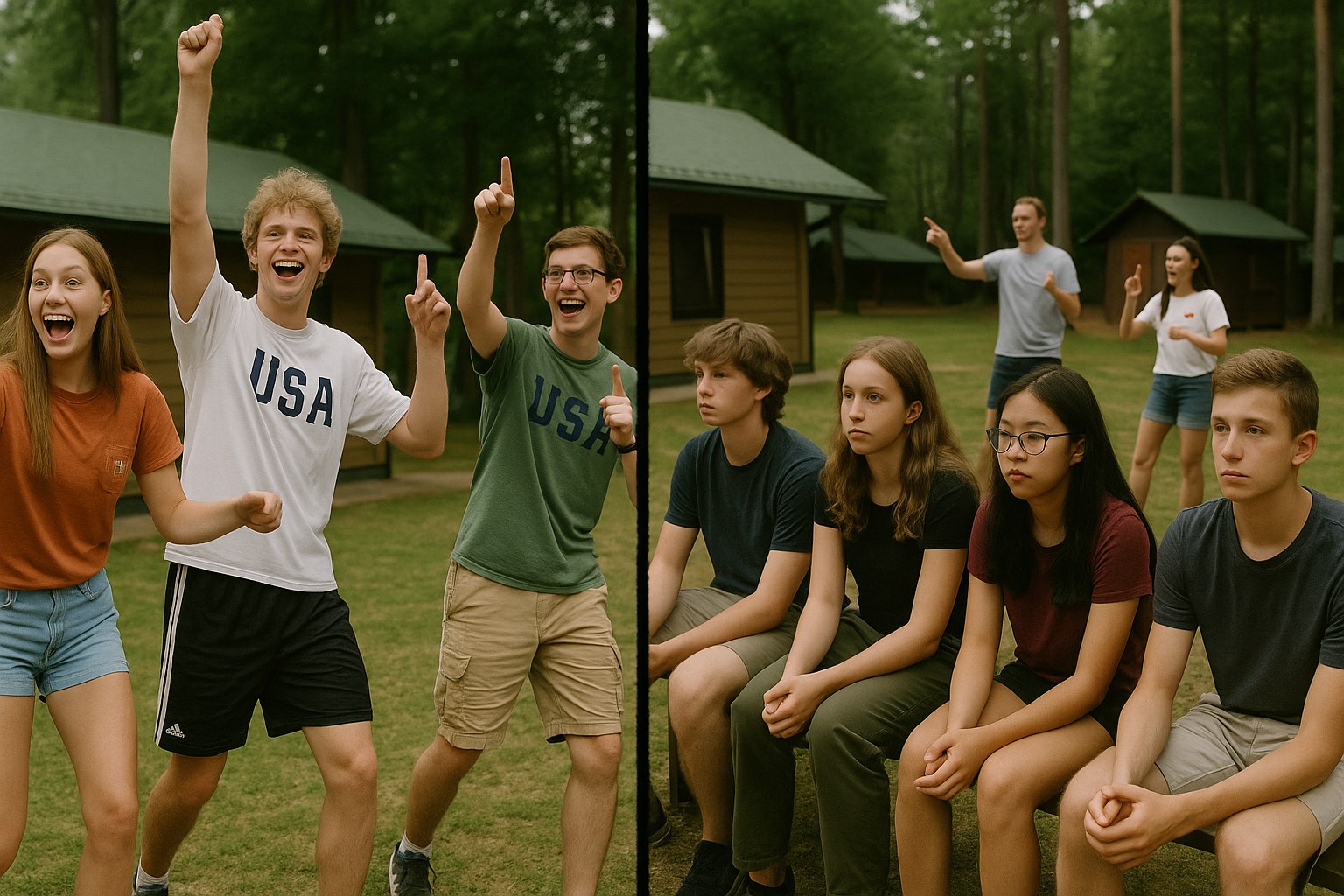
Case studies illustrate how youth leadership mission trips Poland can either catalyze lasting leadership or leave little behind. Below are two extended narratives — one showing best practice, the other highlighting common pitfalls. These stories are adapted from actual team reports and ministry feedback in Poland.
A midwestern U.S. church sent 12 teens to partner with Proem Ministries at their Zakościele campus. Before departure, students completed a 6-week discipleship course, practiced testimonies, and met weekly to learn Polish phrases. At camp, each teen was paired with a Polish co-leader in cabins. Their tasks included leading English discussion groups, organizing games, and sharing daily devotionals. Every evening, Proem staff facilitated debrief circles where both American and Polish leaders reflected and prayed together. By the end of the week, participants had not only served but also learned how to guide peers, handle group conflict, and present faith in a relational way.
The story didn’t end there. Upon returning home, students launched a peer-led Bible study at their high school, using the same methods they practiced in Poland. Their home church youth pastor reported that six months later, those students were still leading faithfully. Proem, meanwhile, integrated the Polish co-leaders into year-round follow-up groups. A cross-border pipeline of discipleship had been built, multiplying leadership on both sides.
Contrast that with another team of 15 students who traveled with minimal preparation. They joined a Josiah Venture English camp but arrived without training in small-group facilitation or cultural sensitivity. While the camp itself was well-run, many of the visitors defaulted to being “participants” rather than leaders. They enjoyed cultural exchange but rarely stepped into leadership moments. There were no structured debriefs, and students returned home inspired but unclear on next steps. Within weeks, enthusiasm waned. Polish leaders carried on with local follow-up, but the visiting team’s growth plateaued because there was no post-trip integration plan.
The lesson: preparation and partnership are decisive. Teams that enter Poland with intentional training, serve alongside Polish leaders, and commit to structured follow-up see measurable leadership growth. Teams that neglect these elements may still experience cultural enrichment, but the leadership impact is shallow and short-lived.
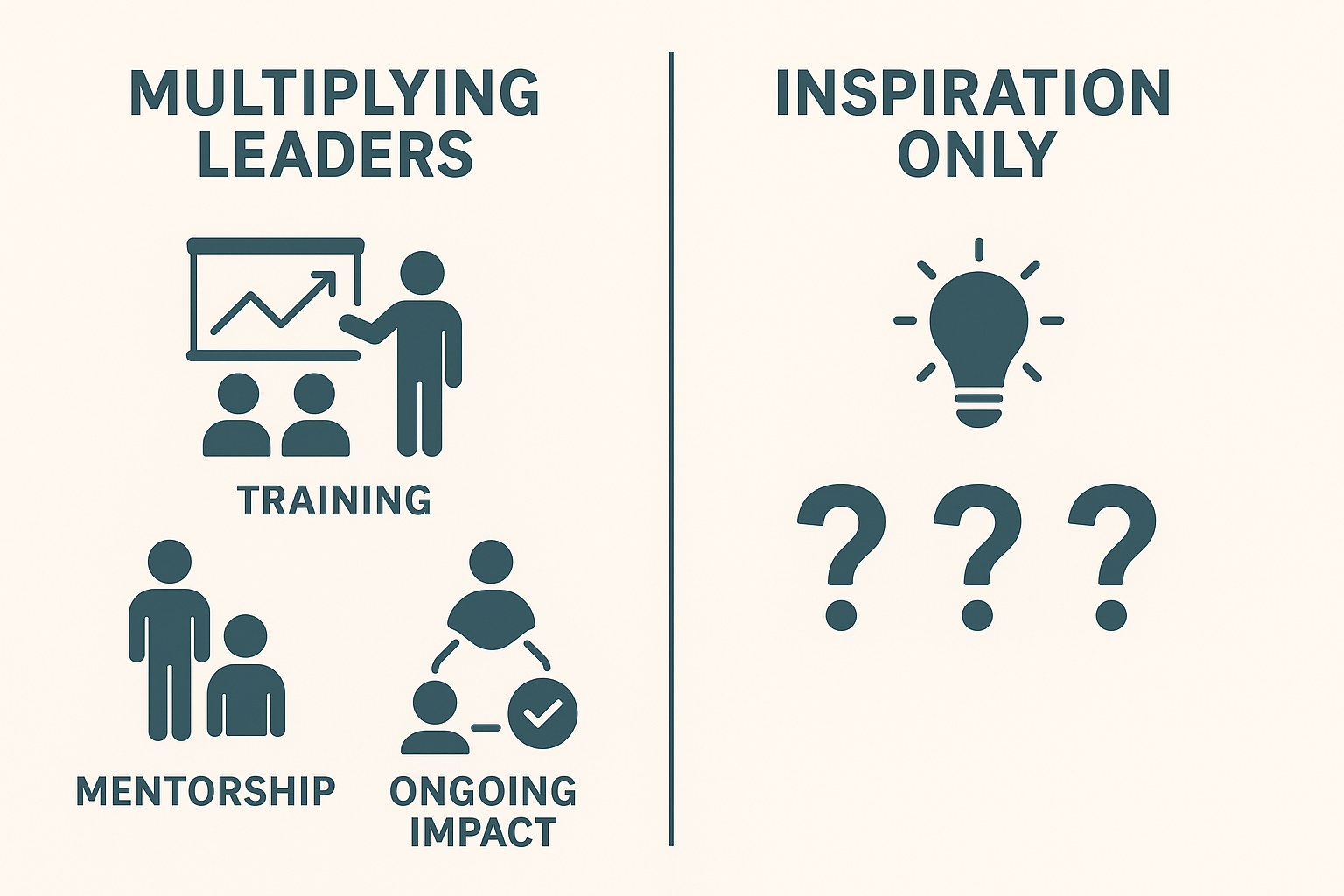
The contrast between well-prepared and under-prepared youth leadership mission trips Poland highlights the difference intentional structure makes. This table summarizes the outcomes of the two case studies, showing how preparation, partnership, and follow-up determine whether leadership growth is sustained or short-lived.
| Factor | Scenario 1 — Multiplying Leaders | Scenario 2 — Inspiration Only |
|---|---|---|
| Pre-Trip Training | 6-week discipleship course, cultural prep, role-play practice | Minimal preparation; no cultural or leadership training |
| Partnership with Hosts | Paired with Polish co-leaders; daily shared responsibilities | Visitors remained mostly as participants; little integration |
| Mentorship & Debrief | Structured daily debrief with feedback from Polish mentors | No structured debrief; missed opportunities for reflection |
| Post-Trip Integration | Launched peer Bible studies at home; ongoing Poland follow-up | No integration plan; enthusiasm faded within weeks |
| Leadership Outcomes | Students gained confidence, skills, and long-term ministry vision | Students enjoyed cultural exchange but little leadership growth |
Comparisons like this reinforce a simple truth: leadership development does not happen automatically. It must be nurtured through intentional preparation, embedded partnerships, and structured post-trip plans. These are the non-negotiables that turn a short-term mission into a leadership laboratory.
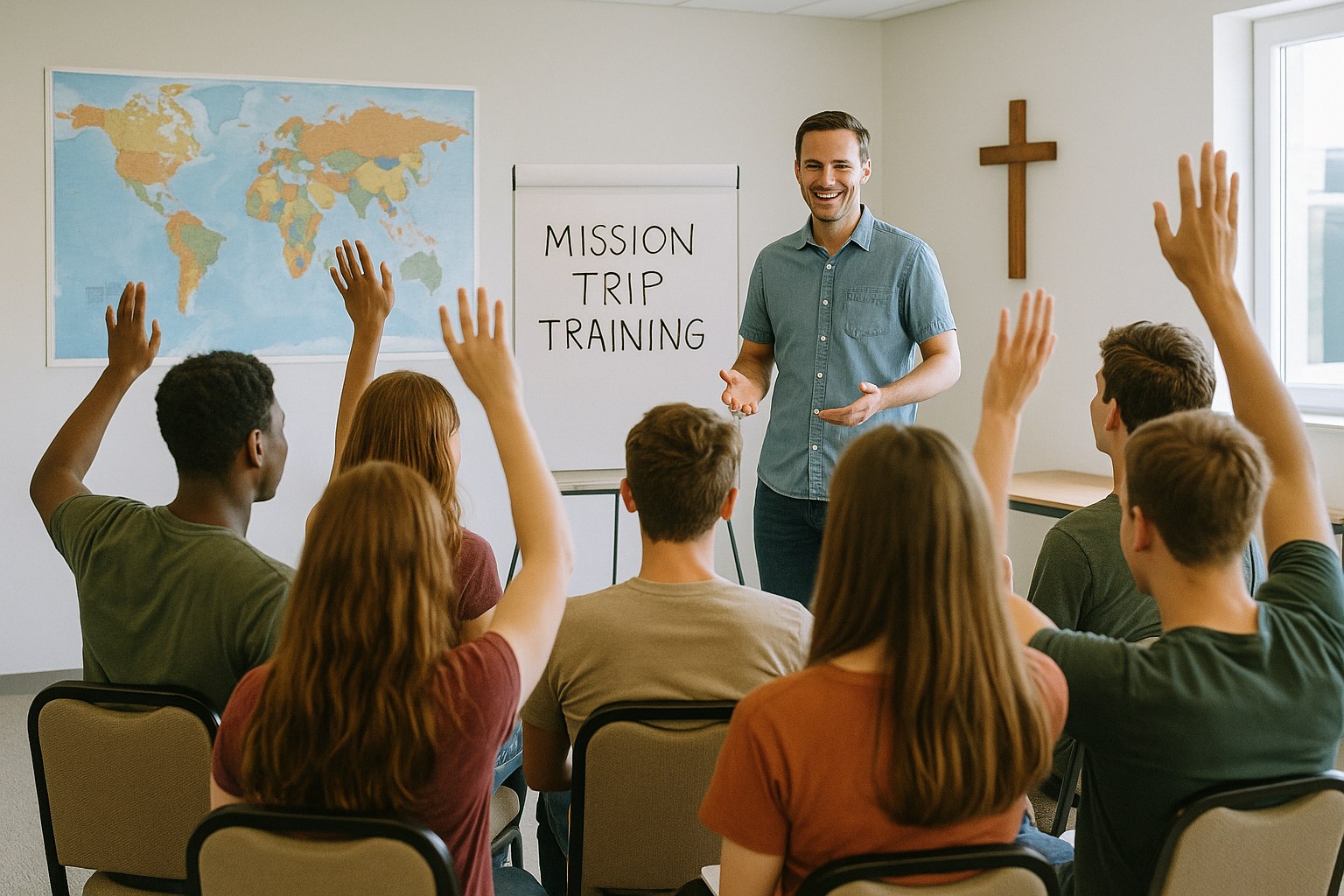
Most youth leadership mission trips Poland run between 8 and 14 days. Research and field practice show this is the sweet spot: long enough for students to build relationships, step into leadership roles, and adapt to cultural rhythms, but short enough to remain accessible for families and church schedules. In Europe, 8–10 days is common due to travel time and summer windows. Anything shorter risks being little more than tourism; anything much longer can overextend teams and hosts. Ministries like Josiah Venture and IMB note that the highest growth occurs when students are stretched for at least a full week of service, with time for both orientation and debrief. A sample rhythm might include two days of training, five days of camp ministry, and one or two days of debrief and cultural immersion before departure.
The cost of youth leadership mission trips to Poland typically ranges from $1,800–$2,800 per participant, depending on airfare, length of stay, and the hosting ministry. This usually includes flights, ground transportation, housing, meals, ministry supplies, and travel insurance. Some organizations add a program fee (covering camp operations, translators, and facilities). It’s best practice to provide transparent budgets to families, breaking down what fees cover. For instance, Proem Ministries lists costs that cover accommodation at their Zakościele campus, three meals per day, and camp program materials. Fundraising is often part of the preparation process, teaching students stewardship and community support. Many churches use sponsorship letters, events like car washes, or support from mission funds to offset costs.
Training is multi-phased. Before the trip, teams meet regularly for discipleship, cultural orientation, and practical skills like testimonies, small-group facilitation, and basic Polish phrases. Leaders often use checklists and curriculum developed by mission agencies. On the ground, training continues through daily debriefs and mentorship cycles: Polish leaders coach visiting teens after each activity, offering feedback and encouragement. Josiah Venture’s “discipleship labs” are a model — mixing workshops, evangelism, and real-time reflection. This blended training ensures growth is not theoretical but practiced in real settings. Adults act as coaches rather than directors, pushing students to step up and take ownership of tasks.
Yes — Poland has one of the richest ecosystems of Christian youth camps in Europe. Josiah Venture’s English and music camps, Proem’s summer programs, Word of Life’s sports and Bible camps, and YWAM’s youth clubs all welcome international teams. These ministries specialize in pairing foreign teens with Polish peers, ensuring camps are not just events but launchpads for discipleship. For example, Proem’s Zakościele campus hosts around 2,500 youth each summer, many of whom return year after year. Word of Life’s “English4Life” program integrates language learning with Bible study, producing long-term spiritual growth. These camps are purpose-built for leadership development, making Poland an unparalleled training ground for student leaders.

Youth leadership mission trips Poland are more than summer experiences — they are incubators for the next generation of leaders. Poland’s unique blend of established ministries, post-Catholic openness, bilingual dynamics, and refugee integration makes it one of the most effective training grounds in Europe. From Josiah Venture’s H2O Center to Proem’s Zakościele campus, from Word of Life’s church partnerships to YWAM’s cross-cultural hubs, every structure is designed to give students real leadership responsibility and mentorship that continues after the trip.
The evidence is clear: teams that prepare well, partner deeply, and commit to post-trip integration see exponential growth. Students come home more confident, more servant-hearted, and more equipped to lead in their schools, churches, and communities. Polish peers benefit too, as international friendships reinforce local discipleship pipelines and build capacity within churches. When structured ethically, these trips avoid voluntourism and instead multiply leaders across borders.
For churches and parents considering how to invest in their teens, the choice is strategic. A Poland youth mission is not just a cultural exchange; it is a proven leadership laboratory with long-term impact. The key is intentional design: prepare students thoroughly, partner with ministries that emphasize sustainability, and ensure lessons flow back into the home context. Do this, and a two-week trip will echo for years in the life of every participant and community they touch.
Ready to explore opportunities? Ready to take the next step? Plan your Youth Leadership Mission Trip to Poland with English Wizards today.